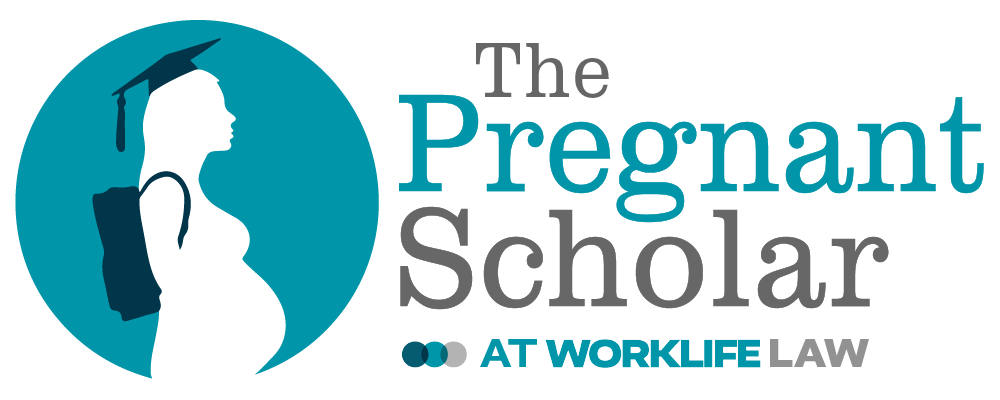21 Jun Pregnant Scholar Statement on Recent Title IX Lawsuit Decisions
Update: Additional preliminary injunctions have been ordered, impacting 26 states and beyond. To learn more, see our latest update and FAQ post, here.
In the past week, two federal judges have issued rulings in response to challenges to the new Title IX regulations from the Department of Education. As a result of these rulings, the August 1, 2024 enactment of the new Title IX regulations has been temporarily blocked in Idaho, Indiana, Kentucky, Louisiana, Mississippi, Montana, Ohio, Tennessee, Virginia and West Virginia while the cases are fully adjudicated.
Jessica Lee, Director of the Pregnant Scholar Initiative and incoming Co-Director of the Center for WorkLife Law at UC Law SF, issued in following statement in response:
“We’re devastated that students will suffer while the legal system addresses these politically-motivated lawsuits. In particular, we are concerned that pregnant, postpartum, and parenting students will not have the basic support they need to continue their education in the affected states.
This year alone, The Pregnant Scholar’s legal helpline has heard from dozens of students who were denied pregnancy accommodations, maternity recovery leave, and/or lactation breaks. We have also supported students who have faced harassment and discrimination because they are parents or because they’ve had a miscarriage and/or abortion. Without the clear guidance provided by the new Title IX regulations, these students faced grade penalties, harm to their health, and even forced dismissal from their academic programs. Pregnant, postpartum and parenting students desperately need the strengthened protections offered by the Biden Administration’s new Title IX regulations—protections which have now been put on hold.”
What’s the controversy?
The legal cases at issue center on the Title IX regulation’s protections related to discrimination on the basis of gender identity, sexual orientation, and sex stereotypes—which impact LGBTQI+ students alongside many others, including students impacted by motherhood bias and fatherhood bias. The Supreme Court has already made clear in Bostock that federal legal protections against sex discrimination necessarily include discrimination based on gender and related stereotyping, and other federal courts have already applied that interpretation of the law in the student context.
Another key issue raised in other Title IX cases is the regulations’ requirement to not discriminate on the basis of abortion; a rule that has been a part of the Title IX regulations since 1975. Note that Title IX already allows educational institutions to decline to pay for or provide abortion health services and offers the potential for religious institutions to seek exemptions to the extent following Title IX would conflict with religious beliefs.
What legal protections remain in effect?
Educational institutions and policymakers should remember that the existing Title IX regulations continue to apply even while the new ones are enjoined. For nearly fifty years, the regulations have mandated that educational institutions:
- can’t discipline or harass a student or employee because they are pregnant, have given birth, or have had a miscarriage or abortion.
- must allow leave for pregnancy, childbirth, miscarriage and/or abortion for students as long as their physician says is medically necessary, and to employees for a reasonable period of time.
- must provide accommodations to students with health needs related to pregnancy, childbirth, miscarriage and/or abortion to ensure they have an equal access to education. This includes providing accommodations, leave, and other benefits to at least the same extent as they are provided to students with disabilities.
- cannot discriminate on the basis of sex, which includes adverse treatment based on stereotypes about how people of a certain sex should act.
Additionally, educational institutions should remember that employees have many of the rights articulated in the new Title IX regulations under other laws which remain in effect. The PUMP for Nursing Mothers Act and similar state laws require employers to provide employees with lactation breaks and space. The Pregnant Workers Fairness Act requires employers to provide reasonable accommodations for all pregnancy-related conditions. These laws apply in addition to pre-existing Title IX rights, and are not impacted by these recent injunctions.
What’s next?
Educational institutions in affected states should continue to enforce the pre-existing Title IX regulations (described above). In addition, educational institutions in those states can—and should—continue efforts to implement the new regulations or at least prepare for implementation. Educational institutions’ preparation is critical to avoid liability, as the injunction can be lifted in the future with little notice; if courts decide the regulations should go into effect, schools and colleges can have as little as one day to make changes. Finally, we must not lose sight of the fact that enacting the new regulations for pregnant and parenting students will support their ability to access an education. Each additional step taken—whether legally mandated or not—is a step closer to ensuring pregnant, postpartum, and parenting students can achieve their educational goals and gain economic security for their families.
Students, administrators and others with questions regarding the new Title IX Regulations should review our 2024 Title IX Toolkit, or contact us for more information.




